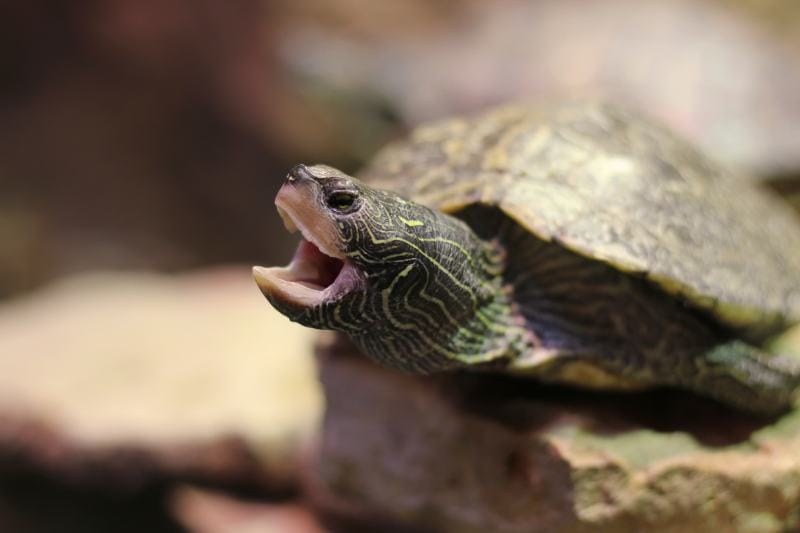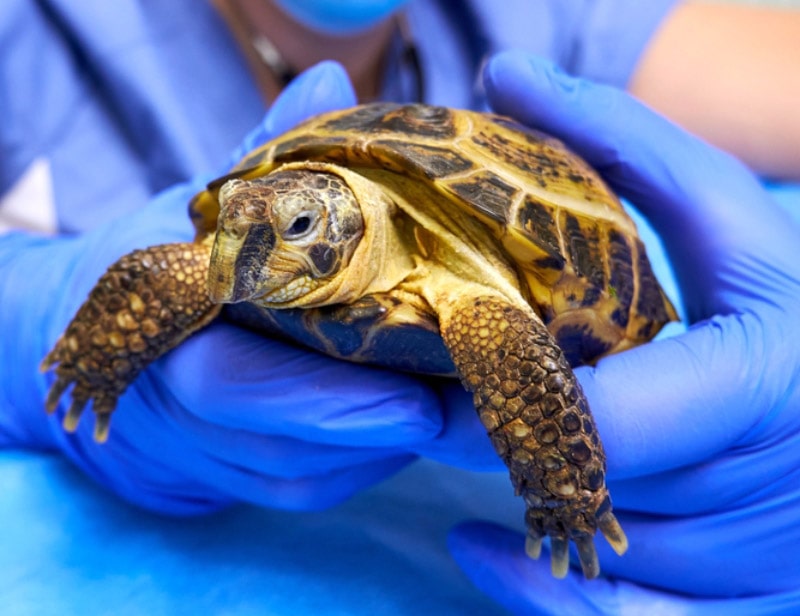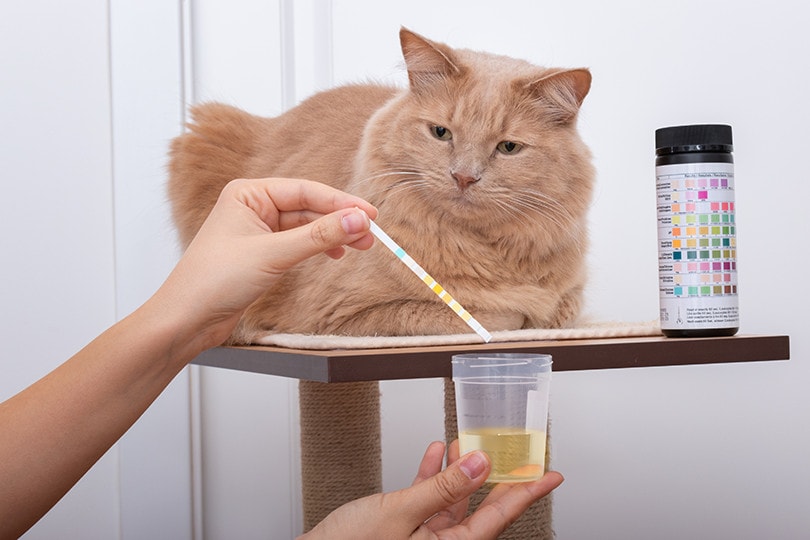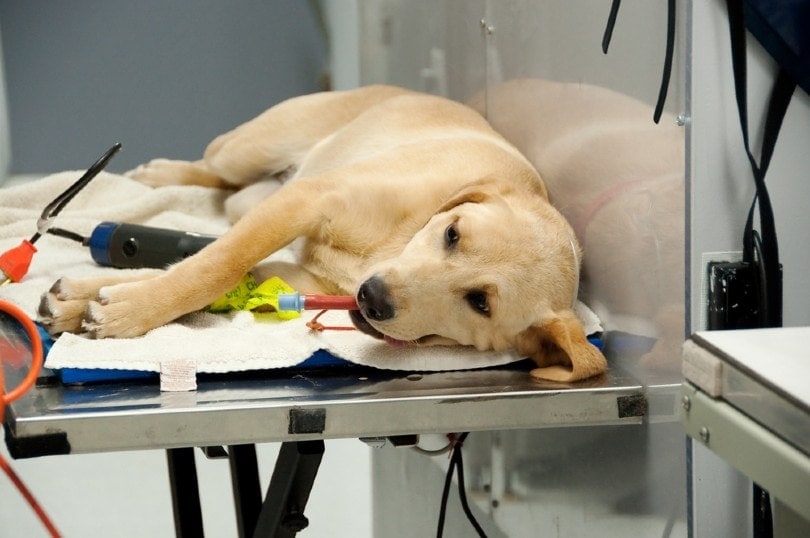Turtle Throwing Up: Signs, Causes & Treatment (Vet Answer)
Updated on

Turtles usually have a ravenous appetite at mealtimes, so what do you do if you realize they aren’t keeping food down, vomited, and maybe don’t want to eat now? How big of a deal is that? Can turtles even vomit? Not all species can, so it’s a fair question. Here’s what’s going on when you see your turtle bring back up their food.
Vomiting Versus Regurgitation
Vomiting is when the stomach and abdominal muscles contract to expel its contents orally. It is an active process with effort.
Regurgitation is the passive expulsion of food from the stomach, usually because the food doesn’t agree with the stomach in one of several ways.
Important Note: Turtles appear to be prone to regurgitation, but when you look into this topic, it’s almost always referred to as vomiting across the internet. Since this isn’t fully studied, for this article, we’re going to continue with that phrasing. It’s important to know the difference, though, and we’ll show you why along the way.

What Are the Signs of Vomiting in Turtles?
Sometimes you’ll see a turtle vomit with your own eyes, and sometimes you just find possible evidence of it. In most cases, a turtle that vomits will bring up the substrate from their enclosure or undigested food. If you feed your turtle and return later to find floating food or a wet pile of food on their substrate (aquatic versus terrestrial) that shouldn’t be there, it means they brought that back up.
Turtles do produce bile, and if they vomit, a small amount of stomach contents that are liquid and contain bile may be brought up alternatively. This can be hard to catch if you don’t see it happen, but if you are there, you may see them expel what looks like water that may be tinged green, yellow, brown, or even red.
Turtles that are feeling under the weather may not be eating well, hiding, lethargic, or having diarrhea as well.
What Are the Causes of Vomiting in Turtles?
The most common thing you’ll see is a turtle regurgitating their food. This can happen for several reasons. If the food they’re offered is too big, it will be prone to not making it to the stomach and staying there. Similarly, feeding too much food or feeding too often can also cause this to happen. If the food is expired, spoiled, or an inappropriate diet for the turtle, that all also might come back up.
Incidents like this shouldn’t happen very often. If they are, you need to assess their diet for areas of improvement, and if that isn’t the issue, then something may be wrong with the mouth, esophagus, or stomach of your turtle, and they should be seen by a vet.
Turtles are also prone to eating objects around their enclosure that they accidentally get access to or even their substrate when applicable. Since they can’t digest these items, if you’re lucky, the turtle will bring them back up.
If a turtle eats something they shouldn’t and it passes into the intestines, there’s a chance it can get stuck there and cause an obstruction. This is very serious, and this is when you might see your turtle truly vomiting rather than regurgitating. Since nothing can make it by, they will start retching or bringing up water from the front instead.
Another common cause of true vomiting is poor water quality. This can be toxic to the turtle or at least stress them and their immune system. The generalized inflammation this triggers can cause vomiting or worse things like infections, which can make the issue worse.
Lastly, some GI parasites, especially any that like to live in the stomach or early intestines, can trigger vomiting. Turtles are prone to parasites, and most veterinarians will try to screen for GI parasites at their annual examinations yearly as needed.

How Is Vomiting in Turtles Treated?
To treat vomiting in turtles, we need to identify the underlying cause. The first step is usually checking their water parameters and assessing their diet. If anything is found wrong, correcting the issue will usually stop the vomiting.
If that doesn’t lead to an answer, testing can be done to further narrow down the options. Bloodwork and X-rays of the turtle can identify blockages, infections, parasites, and more. Surgical intervention for a GI obstruction in a turtle can be a difficult procedure since you have to work around their shell, but sometimes obstructions can be removed via endoscopy, a camera, and a tool passed through the esophagus without needing to make an incision.
Many of the same medications used to treat parasites in dogs and cats are also what we use for turtles vomiting because of GI parasites.
Antibiotics can be given several ways when needed, via injection or medication-loaded food usually.
How Do I Care for a Turtle That Is Vomiting?
As soon as you think your turtle has vomited, check their food for expiration dates and signs of spoilage and assess if the diet is appropriate for our turtle’s species. If everything checks out, you should reach out to a veterinarian at this point.
After establishing the likely cause, they may prescribe medication or other treatments that you’ll want to continue with from home. If you’re having any trouble, reach out to your veterinary team, and they will likely know tips and tricks to help you or may make an alternative plan.

Frequently Asked Questions
Do turtles get Salmonella?
While turtles can carry Salmonella, it rarely makes them or other reptiles ill, and it shouldn’t be a cause of vomiting in your turtle.
How often should I change a turtle’s tank water if I don’t have a filter?
You want to do a 30–50% water change weekly if you don’t have a filter. Failure to do so can cause the turtle to fall ill, which can include vomiting.
Do turtles like their water dirty?
This can sometimes be a common misconception, but no, they do not. Although you may be used to seeing them in murky lake water under layers of detritus, the water itself in these systems is balanced and clean. Tank water must be kept clean as the ecosystem of an aquarium tank is very different from that of a pond, lake, or river.
What substrate should I avoid in a turtle tank?
Sand, small rocks or pebbles, certain cat litters, and wood pieces or shavings are all examples of substrate options that should be avoided in a turtle tank as they can accidentally ingest these, which can cause a GI obstruction.
Final Thoughts
Whether regurgitation or vomiting, it isn’t normal for a turtle to do this regularly. If you notice it happening, you’ll want to check their diet and environment for problems, and if you don’t identify the issue, reach out to a veterinarian for the next steps. In most cases, fixing the underlying problem will solve the vomiting issue so that your turtle can go back to their regularly scheduled antics.
Featured Image Credit: DAndreev, Shutterstock














